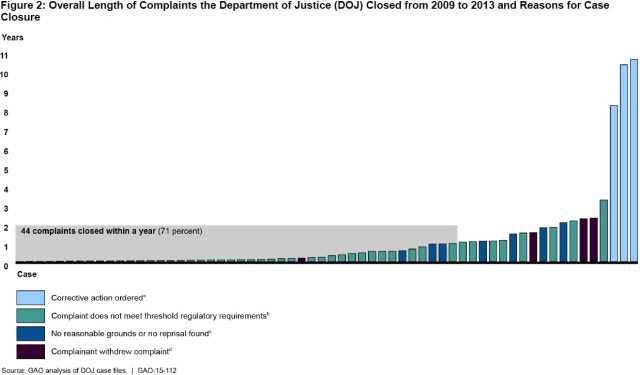What Happens to FBI Whistleblower Retaliation Complaints?
- 44 complaints (71%) were closed within a year,
- 15 complaints took from 1 to 4 years to close, and
- 3 complaints took from 4 to 10.6 years to close.
The 3 cases that took the longest were the only ones we reviewed where DOJ ultimately found in favor of the whistleblower and ordered corrective action, such as back pay or reimbursement for attorney’s fees.
 (Excerpted from GAO-15-112, click here for figure with notes)
(Excerpted from GAO-15-112, click here for figure with notes)
- provide complainants with estimates of when to expect DOJ decisions; and
- monitor whether the DOJ investigators examining the complaints comply with requirements, such as updating the complainant on the progress of the investigation.
- DOJ should clarify whom FBI employees should report allegations of wrongdoing to if they want to be protected from retaliation, and
- Congress may want to consider allowing FBI whistleblowers to seek corrective action for retaliation if they reported alleged wrongdoing to supervisors or others who are not among the current 9 entities.
- Questions on the content of this post? Contact Dave Maurer at maurerd@gao.gov.
- Comments on GAO’s WatchBlog? Contact blog@gao.gov.

GAO's mission is to provide Congress with fact-based, nonpartisan information that can help improve federal government performance and ensure accountability for the benefit of the American people. GAO launched its WatchBlog in January, 2014, as part of its continuing effort to reach its audiences—Congress and the American people—where they are currently looking for information.
The blog format allows GAO to provide a little more context about its work than it can offer on its other social media platforms. Posts will tie GAO work to current events and the news; show how GAO’s work is affecting agencies or legislation; highlight reports, testimonies, and issue areas where GAO does work; and provide information about GAO itself, among other things.
Please send any feedback on GAO's WatchBlog to blog@gao.gov.
